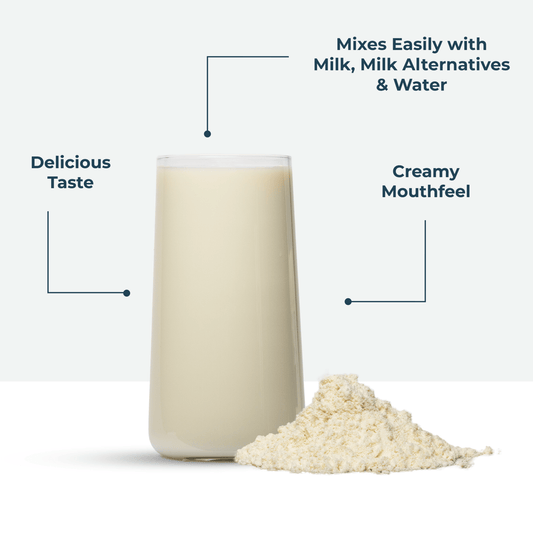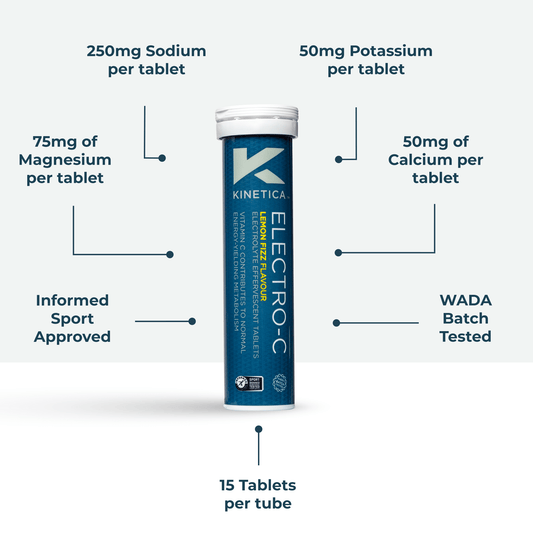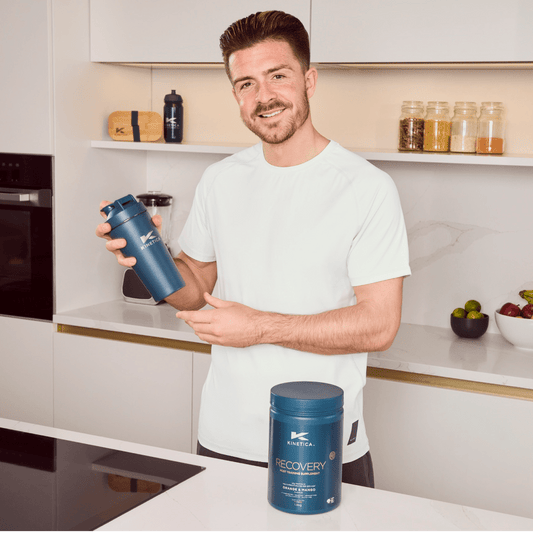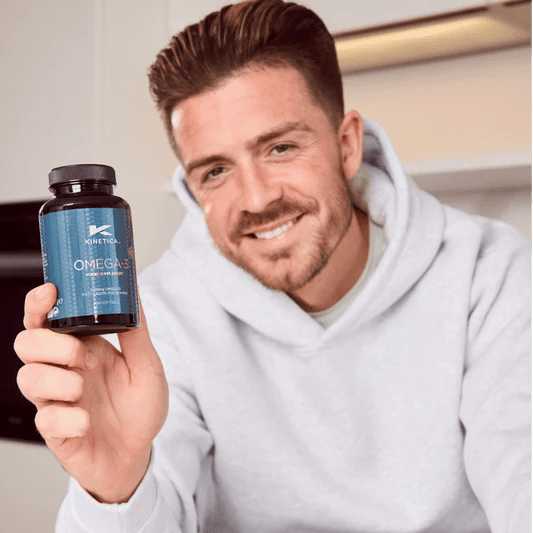An Introduction to Workout Supplements

The world of workout supplements can be a daunting place, whether you’re new to the idea of taking workout supplements, or a weekend warrior hitting the gym on the regular. After all, there are lots of products offering a wide range of workout-enhancing benefits.
That’s why we’ve created this beginners guide to workout supplements, including how to know which you should take, how they work, and what to look out for - with insights from the Kinetica Sports team…
What are workout supplements?
Sports supplements, sometimes referred to as ergogenic aids, are products specifically formulated to support exercise and athletic performance. They deliver key nutrients, (like proteins, carbohydrates, and other vitamins and minerals), in a concentrated form to address specific fitness needs – like improving endurance, boosting strength, or aiding recovery.
Sports supplements come in a variety of forms, including tablets and capsules, powders that can be mixed into liquids, ready-to-drink beverages, and snack bars.
Remember, supplements are not a substitute for a balanced diet, but rather an addition to plug those nutritional gaps, or optimise performance. A banana or a piece of grilled chicken will give you similar benefits as workout supplements, but they lack the unmatched convenience – especially for those of you with busy lifestyles.
Why do people use workout supplements?
During exercise, our bodies consume three main sources of fuel; carbohydrates, protein, and fat.
Carbs are the most efficient source of energy burned during exercise. They are stored in the liver and skeletal muscles in the form of glycogen, which can be easily metabolised into glucose, a great energy source to fuel the brain, nervous system, and muscles. The body’s glycogen supply can provide enough fuel for up to two hours of vigorous exercise. When you run out, you’ll experience the feeling of “hitting the wall”.
As your glycogen levels decrease, your body starts to seek out other sources of fuel. Fat is the first to burn, especially during low and moderate-intensity activity. When your glycogen levels dip to their lowest, your body begins to break down skeletal muscle protein for glucose production.
Sports supplements taken before, during, or after exercise then, are designed to prevent your body from dipping too deep into its reserves of necessary nutrients, so that your workout works to help you grow. Better yet, you can choose supplements that support your muscle growth, reduce muscle soreness, and help your body to recover quickly from an intense workout.
Another reason to include sports supplements in your diet? Convenience. For those of you with rigorous training plans, consuming sufficient protein, carbohydrates, or micronutrients through food alone can be challenging. Supplements help you meet your dietary requirements by providing optimal performance and recovery without the hassle of trying to cram in your nutritional needs into meals.
With so many benefits, it’s no surprise that many people around the world use workout supplements to complement their fitness regime. But, we cannot express this enough:
A well-rounded approach to fitness – prioritising balanced nutrition, hydration, and good sleep – should always come first. Supplements are most effective when they complement these foundational habits.
Now with all that out of the way, let’s get onto the big question you’re surely asking yourself…
What type of sports nutrition supplements should I take?
Workout supplements are usually split by when you should take them, and/or what they do. Here, we’ve picked out some key ingredients (and which supplements you can find them in) to help you understand the potential of sports supplements…
Pre-workout supplements
Pre-workout formulas typically contain a mix of active ingredients aimed at boosting energy, endurance, and focus. They are designed to kick-start your workout, so the optimal time to take these supplements is usually between 15 and 30 minutes before you begin your workout, but can be consumed during exercise if needed.
Caffeine
We reckon you’re pretty familiar with caffeine – and know at least the basics of the effects it has on the body.
Caffeine acts as a central nervous system stimulant, making you feel more awake and less tired. Research has shown that caffeine can benefit athletic performance for short-term, high intensity exercise and endurance based activities1. It increases endorphin release, improves neuromuscular function, and reduces your perception of exertion during exercise.
Note: here we say the ‘perception’ of fatigue. Caffeine itself doesn’t act directly in the body to make it less tired. Instead it gives you more mental energy to push through. That’s why you don’t want too much before bed, as it keeps your mind awake.
Beyond boosting energy, caffeine has been found to improve focus and mental clarity during workouts, helping you maintain concentration on form and technique. Its ability to mobilise fatty acids for energy can also make it a valuable tool for those engaging in fat-loss routines.
Want an example of how caffeine can be best used pre-workout? Our Caffeine Gel is a quick source of energy-boosting carbohydrates, B vitamins, electrolytes, and caffeine – perfect for endurance athletes who need a pick-me-up.
Learn more: check out What are Energy Gels and How Can They Help You?
Beta-Alanine
One of the worst feelings when working out is lactic acid build-up. Lactic acid is a natural byproduct of anaerobic energy production in your cells. Muscle cramps, aches, fatigue, and nausea are just some of the unpleasant symptoms, and can be enough to end a workout fast.
So how do you counter this? Beta-alanine, that’s how.
Beta-alanine is an amino acid produced in the liver. It increases muscle concentrations of carnosine, which the body can use to reduce muscle acidity caused by lactic acid during exercise2. It can also be found in fish, poultry, and meat. But for vegans, vegetarians, and those who find it hard to workout after a meal, there are supplements that can provide a boost of amino acids fast.
Try our PreFuel Pre-Workout Supplement. Available in berry, citrus, and watermelon flavours, it contains branched chain amino acids (BCAAs) which contain the essential vitamins, minerals, and caffeine to boost your performance.
The benefits of beta-alanine extend beyond just buffering lactic acid. Regular supplementation can improve endurance in high-intensity interval training (HIIT) and resistance training, allowing you to complete more reps or hold out longer in challenging sets.
Note: beta-alanine can also cause a harmless tingling sensation (known as paresthesia) in some individuals, a sign that it’s actively working to enhance performance.
Creatine Monohydrate
One of the most popular (and most researched) workout supplements, creatine is a compound that comes from three amino acids. Creatine helps to produce adenosine triphosphate (ATP), which provides energy to your muscles for short, high-intensity workouts.
The body will create approximately 1-2g of creatine every day through the liver, pancreas, and kidneys, and store it as phosphocreatine in your muscles to be used for energy. Research has found that creatine supplementation enhances exercise capacity, allowing you to increase your training volume3. This is an ideal solution for those looking to improve muscular strength and power.
Creatine’s benefits go beyond power-based training. It may also support recovery by reducing muscle damage and inflammation after workouts, allowing for shorter recovery times between sessions.
Creatine can be obtained from red meat and seafood, or as a handy supplement. Flavourless, gluten-free, and suitable for vegetarians, Kinetica Sports Creatine Monohydrate is made from 100% CreaPure®, and is trusted by athletes far and wide to provide a high performance boost to your high intensity training.
Learn more: discover more with our guide to Which Type of Creatine is Best? Exploring Creatine Monohydrate…
Post-workout supplements
Post-workout supplements don’t just help with the repair and recovery of muscles, but also increase muscle mass. The period immediately after your workout, known as “the anabolic window” is when your muscles are most receptive to nutrients, so aim to consume your post-workout supplements within an hour of ending your exercise.
Protein powders
Protein is one of the most important nutrients our bodies need to consume, and is essential for growing muscle, strengthening bones, making hormones and much more. The average recommended levels of daily protein are approximately 0.75g per kilogram of body weight. However, for those looking to bulk up and build muscle, this requirement rises significantly.
Protein can be found in a variety of sources, including eggs, milk, plants, and supplements. Protein powders are an excellent source of high-quality protein, which promote muscle growth and repair, and can help with managing weight. Post workout, protein helps to repair the damaged tissues in your muscles, and replenish protein stores in your body.
There are several types of protein powders each of which caters to a different palate.
- Whey Protein: whey is a by-product of cheese production, and is a fan favourite due to its rapid digestion and rich supply of essential amino acids.
- Lean Active protein powder is high in fibre and lower in carb and calories – perfect for those looking to build lean muscle and manage their weight.
- Plant protein powder: made from plant sources like grains, seeds, vegetables, and legumes, plant-based options are a great alternative to whey protein for vegan or plant-based diets, or those with lactose intolerance.
Electrolytes
There’s nothing like the feeling of a good workout, but one thing to remember is that the harder you work, the more you sweat. And, while this is needed for temperature regulation, you need to regain the water and electrolytes you lose from it.
Electrolytes are charged minerals, like sodium and potassium, that help maintain hydration and support muscle and nerve function in the body. When you work out, your body loses electrolytes through our sweat, and if they aren’t replenished, they can cause hyponatremia - a condition that causes headaches, fatigue, nausea, muscle cramps etc4.
The good news is that replenishing your electrolyte levels is pretty straightforward. Using a supplement, like the Kinetica Sports Electro-C Lemon Fizz or Berry Fizz, quenches and replenishes all electrolytes lost during exercise. Simply pop a tablet into water and wait for it to finish fizzing for a super refreshing post-workout beverage (if we do say so ourselves).
Electrolyte restoration can also aid in maintaining peak performance for subsequent workouts, especially for endurance athletes. For those engaging in prolonged activities, pairing electrolytes with carbohydrate-rich recovery snacks can further replenish and boost energy levels for faster recovery.
Carbohydrates
When you know you’ve put in your all during a workout session, the resulting tiredness can feel extremely satisfying. But, since your body uses a lot of energy when you exercise, you still need to replenish this afterwards to support your recovery and daily activity.
That’s where carbs come in. While they’ve often been demonised by different diets, carbohydrates are an essential food group for a reason. They’re made up of long chains of sugar molecules, which are broken down into smaller molecules for better absorption. The glucose you get from carbohydrates is essential for cellular energy production, and excess is stored as glycogen in your muscles. But why is this important after exercise?
Research suggests that including carbohydrates into your post-workout nutrition helps to replenish your glycogen stores quickly, and is linked with improved capacity for better performance in the future5.
Top tip: want to make the most of your recovery? Ingesting carbohydrates and protein has been shown to have increased benefits compared to carbohydrates alone6. Our Kinetica Sports Recovery Powder combines 40.2g of carbohydrates and 22.2g protein per serving to help you maximise the benefits of your nutrition and support your performance goals.
Other notable supplements
We’ve covered pre- and post-workout supplements, but there are some other supplements you should consider to maintain a healthy lifestyle:
Omega-3
Best known for its anti-inflammatory properties, Omega-3 supplements can help to reduce muscle soreness, and have been found to increase blood flow to muscles during exercise. This increased blood flow not only aids recovery but also enhances oxygen delivery to working muscles, improving endurance and overall performance.
Regardless of your fitness level, Omega-3 is a great option to improve your nutritional health, and with Kinetica Omega-3 Fish Oil capsules, you can hit the recommended daily intake with ease.
Zinc and magnesium
One of the key components to a great workout is a good night’s sleep. Sleep is crucial for helping your body to recover, both physically and mentally.
Zinc plays a vital role in muscle recovery and immune function, as well as in the synthesis of proteins and enzymes critical for repair and growth. It also supports testosterone production, a key hormone for muscle building. Magnesium helps regulate muscle contractions and prevents cramps, making it indispensable for athletes and fitness enthusiasts. It is also involved in energy production at the cellular level, ensuring optimal function during both exercise and recovery.
Inadequate levels of magnesium can lead to fatigue, reduced endurance, and even elevated stress levels. Zinc and magnesium combined create a powerful duo that supports deep, restorative sleep, allowing your body to regenerate and prepare for the next workout.
Getting your daily intake of zinc and magnesium can give your body the nutritional pick-me-up required to get a good rest, so if you want to make the most of your downtime, try Kinetica Sports Zinc Mag+. Packed with zinc, magnesium, and other valuable minerals, these are designed to promote healthy sleep.
Vitamin D
Vitamin D is an essential nutrient that helps the absorption of calcium and phosphorus, influences immune function, mood, memory, and muscle recovery, and supports bone health and muscle function. For athletes, vitamin D deficiency has been linked to impaired muscle performance and increased risk of injuries. Regular supplementation ensures not only optimal recovery but also enhances muscle strength and reduces inflammation.
Getting the best workout supplements
When shopping for workout supplements, it’s essential to only shop with reputable retailers that don’t shy away from displaying nutritional information and ingredients.
Here at Kinetica Sports for example, all of our products undergo rigorous testing to comply with strict Informed Sport and WADA guidelines. These certifications confirm the absence of banned substances and guarantee their quality, so you can train with confidence in the quality of your chosen supplements.
Discover more about our Testing and Certifications to understand just how we provide you with the best workout supplements we can.
Unlock your fitness goals with Kinetica Sports
Whether you’re a weekend warrior looking to up your fitness game, or support your training load as a pro athlete, Kinetica Sports is here to help.
Our extensive range of premium supplements is designed to give you the ‘how’ to your ‘why’, whether it be through energising pre-workout powders, protein-packed recovery options, or health and wellbeing essentials tailored to support your lifestyle.
Want to dive deeper into the world of sports supplements? Visit the Kinetica Sports blog, where you’ll find expert resources, in-depth buying guides, and fun, creative recipes to maximise your nutritional potential.
The Ultimate Guide to Pre-Workout Supplements | What are the Benefits of Electrolyte Tablets? | A Practical Guide to Choosing Collagen Products
Disclaimer: this article is not, nor is it intended, as medical advice. Before making changes to your diet, consult your doctor or dietician for more information.


















